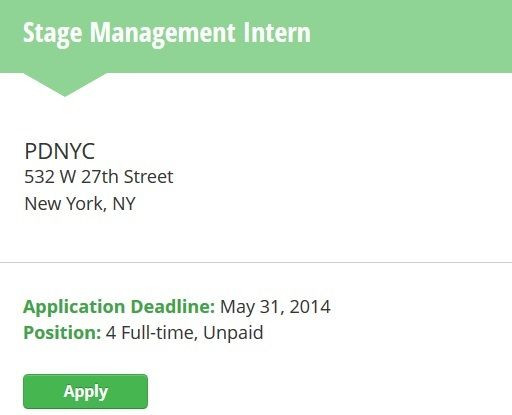‘Sleep No More’ Internship Post Flouts Fair Wage Laws: Unpaid Laborers Asked To Work 10-Hour Days

Updated Wednesday, 5:11 p.m:
Rick Criswell, general manager for “Sleep No More,” responded by saying the show takes wage and hour laws very seriously and that the training interns receive is for the benefit of the interns:
“It is an enormous honor and privilege to be a part of the ‘Sleep No More’ family, even if only for a short time. Learning firsthand in our creative environment from the incredibly talented team involved in this one-of-a-kind piece of art is an opportunity that is not available anywhere else in the world. We are proud of our program and feel equally honored to have the opportunity to educate those who would choose to learn from us.”
Original Post:
They’re selling tickets for $130 a pop, they’ve been playing to sold-out crowds since 2011, and they just built a chic new restaurant in Manhattan’s Chelsea neighborhood. But the people behind “Sleep No More” might also be leaving pivotal security duties in the hands of unpaid laborers.
The wildly popular site-specific riff on Shakespeare’s “Macbeth” posted a job listing last week seeking stage management interns to work alternate four- and six-show weekly minimums for the next three months. The posting, listed on Glassdoor.com via Internships.com, advertises a part-time commitment but then goes on to list 10-plus-hour workdays lasting until 2:30 a.m. on weekends. In addition to running show tracks and breaking down sets, the interns are expected to appear in scenes and even help make sure no one gets hurt:
“Interns are required to learn a minimum of four production tracks, including preshow and postshow assignments. These tasks include helping with prop preset, changeover, and running show tracks, which place them in specific scenes to supervise and ensure safety of both the performers and audience.”
According to U.S. labor laws, unpaid internships are only legal for training purposes, and even then they must meet a series of stringent guidelines. The Fair Labor Standards Act stipulates that unpaid interns may not displace regular employees, and employers may not derive an immediate advantage from the work of unpaid interns.
“Sleep No More” was created by Punchdrunk, a U.K. theater troupe that specializes in immersive productions. The show, in which wandering audience members interact with actors in a haunted house-style labyrinth, opened to critical raves in March 2011 and has been playing sold-out dates at its Chelsea location ever since. The show is coproduced by the company Emursive. Although the company does not disclose box-office figures, the show has been a notable commercial hit. According to the Guardian, producers of the show recently opened a 140-seat restaurant adjacent to the production.

A representative for “Sleep No More” said questions about the internship program should be directed to Rick, the general manager; however, she would not provide more information or even divulge Rick’s last name. Rick did not immediately respond to an email request.
A Google search turned up similar -- although less egregious -- “Sleep No More” internship postings, including a recent posting from the show’s wardrobe department and a January posting from the Facebook page of Marymount Manhattan College’s Department of Theatre Arts.
One person connected to “Sleep No More” told International Business Times that crewmembers sign a nondisclosure agreement and are not at liberty to discuss the internship program. The show is a nonunion production and therefore outside the jurisdiction of Actors’ Equity Association, the trade union that regulates pay scales for actors and stage managers.
In an anonymous February blog post, one recently hired “Sleep No More” intern characterized the opportunity as an “insane internship for insane people with a play dealing with insanity.” Saying that she was offered no pay or housing, the author wrote that it would be her job to “run props up and down the six floors, move audience members out of the way of choreography, and do rapid problem solving,” in addition to standard paperwork duties before and after the show.
She described herself as “the luckiest girl in the world.”
Got a news tip? Email me. Follow me on Twitter @christopherzara.
© Copyright IBTimes 2024. All rights reserved.






















